- Home
- Matt Goldman
Broken Ice--A Novel Page 2
Broken Ice--A Novel Read online
Page 2
Flynn said, “You got any information that can help us out?”
“Not yet.”
“So what do you want?” said Flynn. “I can’t let you in there. They’re still processing the scene.”
“Just a quick look around, Officer,” I said. “I’ll stay out of the way.”
“Hold on just a mother-fucking minute. Jesus Christ. You’re that guy. That guy from the news. Who solved Duluth and Edina and made all the cops look like idiots. No fucking way, buddy. No fucking way I’m letting you in there.”
“Officer Flynn,” said Ellegaard, “I’d like to introduce you to my colleague, Nils Shapiro. The police in both Duluth and Edina were grateful for his help. I should know. I was one of them.”
“Shapiro, that’s it,” said Flynn. “Yeah, Nils Shapiro.” He smiled, and his fleshy cheeks expanded. “Take a walk.”
“Nice to meet you, Officer.” I extended my hand to the big man. He didn’t take it.
“Turn around guys. I’m not fucking around here.”
A March wind pushed from the south. A male cardinal clung to a high, skinny branch in a birch tree and tweet-tweeted the coming of spring. A car behind us on Shepard Road disagreed with the cardinal’s forecast, its snow tires screaming on the pavement that winter would return.
Ellegaard stepped closer to Flynn and lowered his voice. “Listen, Flynn. Nils here was all over the news last year. But it wasn’t his doing. Did you ever see him interviewed? You did not. Because he wouldn’t consent to an interview. Not for the Strib. Not on TV. Not even for the radio. But we still get calls every week begging for one. Someone in this town gets killed, the press wants to know what Nils Shapiro thinks. But every time they call, what do you say, Nils?”
“I say no.”
“You hear that? Nils says no to every request he gets for an interview. But guess what’s going to happen if you don’t let him take a peek in that cave.” Officer Terrence Flynn looked as if he’d just stepped in dog shit. “On TV, Nils will say the town of Warroad is suffering because teenage girls just disappear off St. Paul streets during the hockey tournament. In the newspaper, he’ll say the town of Warroad, which has already lost one of its girls, could very well lose another because St. Paul police bungled the investigation. On the radio, Nils will say that, despite his solving murders in Duluth and Edina, the St. Paul police are so worried about their precious reputation that—”
“I’ll run it up the ladder,” said Flynn. “Just keep your fucking panties on.” The cop walked away.
Ellegaard smiled, quite proud of himself, then his eyes caught sight of something, and his smile disappeared. I looked over my shoulder and saw two police officers escorting a couple about my age toward the entrance of the cave. They wore matching green windbreakers. The woman was red-faced and crying. The man appeared grayish white and walked with a stumbling gait. The parents of Haley Housh seemed to be in separate hells but found each other’s hands as a uniform briefed them before entering the cave. The back of their matching windbreakers said CRAIG’S BAR & GRILL.
The mouth of the cave looked like the mouth of an unpleasant person, a horizontal grimace, twisted and contorted. The police had covered the ground in tarps. The uniform led the Houshes by crawling into the mouth first. The poor Houshes had to forfeit the simple dignity of walking upright to identify the body of their dead daughter. They followed the officer into the cave on hands and knees. A few minutes later, the mouth spit them back out. Mr. Housh’s face had turned red and wet like his wife’s. He labored to breathe. His sobs carried in the cool air. They walked away from the police unescorted, back toward Shepard Road.
Ellegaard didn’t say a thing. We caught each other’s eyes and understood the plan. He raised his voice toward Flynn, who was on his cell near the entrance of the cave. “What’s the holdup, Officer?! I’m about to make some calls. And you do not want me to make those calls!” All eyes turned toward Ellegaard, and I feathered into the shadows of the birch trees.
3
“Excuse me, Mr. and Mrs. Housh.” They stopped and turned and looked at me. Haley’s father’s corn silk blond bangs danced in the breeze over pale blue eyes. His wife stood short and heavy under a home perm. Her blue eye shadow looked like it was imported from Chernobyl. Cursive stitching over the left breast of their matching Craig’s Bar & Grill windbreakers told me their names were Mike and Connie. I said, “I’m sorry about Haley.” Connie buried her head in Mike’s chest.
“Yeah, thanks,” said Mike, a Minnesotan on auto-polite. His voice shook. Then he steered his wife back toward the road.
“My name is Nils Shapiro. I’m a private investigator.” They stopped. I saw a vague recognition in their eyes but they said nothing. “I’m working for Roger and Anne Engstrom.” If the parents of a dead child can be knocked down even harder, hearing the name “Engstrom” did just that. Mike’s face soured, giving him a gestapo-like appearance, and Connie’s lower jaw jutted forward like a bulldog’s. “I’m sorry. I didn’t mean to upset you further.”
“Warroad’s been shit since the Engstroms moved to town,” said Mike. “And now it’s a whole lot worse than shit.”
“No offense,” said Connie, “but we sure as hell ain’t gonna help you help them.”
“I’m not asking for your help. I’m offering my services. Free of charge. Losing your daughter is tragic. I can’t make it any better. But I can help the police figure out what happened.”
It was supposed to be a sales pitch, and maybe that’s how it came out, but the words felt genuine when I heard them. I wasn’t immune to the Houshes’ pain. I’d seen it before in the early days of my solo career, taking money parents didn’t have to help find their missing kids. Mostly teens. Mostly runaways. The only difference being those parents’ anguish was swirled with hope.
The Houshes had just left the last of their hope in a cave. Legally, Haley Housh died as an adult. But in reality, she was a child.
I did want Mike and Connie’s help finding Linnea Engstrom. They knew it, but they welcomed any chance of relief. Learning how Haley spent her final hours might provide the slightest bit. They looked at each other. They didn’t need to discuss it. Then Connie turned toward me and said, “That’s a kind offer, Mr. Shapiro. Thank you.”
“I only have one question at the moment.” They didn’t object, so I continued. “Did Haley have a boyfriend?”
“She did,” said Connie. “At least that’s what she called him. Ben Haas. He lives in Woodbury.”
“Her boyfriend lives in the Cities?”
“Ben worked at a summer camp near Warroad,” said Mike. “They met when Haley was working at the Dairy Queen. They somehow made the distance work, you know with the video chat and all.”
“Do you know if they saw each other last night?”
“They were supposed to after the game. I don’t know if they did. The police are looking into it.”
“Thanks. I’ll be in touch after you give your statements to the police.” I handed them my card. “And don’t hesitate to call. For any reason.”
As I walked away I thumb-typed a note on my phone. Ben Haas: Haley Housh’s Boyfriend-Woodbury. Then Luca Lüdorf: Linnea Engstrom’s Boyfriend—Warroad. And finally, Craig Housh: “Warroad’s been shit since the Engstroms moved to town.”
When I returned to Ellegaard, Officer Flynn stood next to him. The fat cop said, “No one’s fucking happy about this, especially the brass. So here’s how it’s gonna go. Our PR department is telling the press we’ve hired you, even though we’re not giving you a fucking nickel. And you’re going to go along with it or else we’ll be giving the interviews and say you’re more worried about stuffing your wallet than finding missing girls.”
“That’s fair,” I said.
Terrence Flynn raised the yellow police tape and said, “That’s bullshit is what it is.” I ducked under. Ellegaard stayed where he was. “What,” said Flynn, “the ex-cop too high and mighty to look at a dead girl?”
“Not
hing like that, Officer,” said Ellegaard. “Just no need for a crowd.”
Terrence Flynn shook his head then walked me to the cave and handed me to another uniform. Officer Julia Mason had orange hair, freckles, a pug nose, and big gums that looked like the result of unfortunate genetics rather than poor dental hygiene—her teeth were new sneakers white. Her blue polyester cop pants shined at the hips and knees from wear. She led me into the crooked mouth. I wanted to say something about her taking me in because fat Flynn couldn’t fit, but kept it to myself. The story of Ellegaard’s strong-arm tactics had spread. I was less welcome at the scene than dead Haley Housh. I had to behave like a big boy if I wanted even a token attempt at cooperation from SPPD.
I slipped into the cave then stood. LED floods lit up the sandstone walls and ceiling. Graffiti was everywhere, not the artistic kind, but the kind akin to what’s on the stall doors in a middle school bathroom. I learned “The Packers Suck!” and “Andy fucked Patti in the mouth!” and “Javier is a fag!” The proliferation of exclamation points … They just don’t have the impact they used to.
Artists had carved into the soft sandstone walls creating images of penises, flaccid and erect, dripping with something penises should or shouldn’t drip with. The floor was made of sand and was littered with beer cans, schnapps bottles, fast-food wrappers, spent hypodermic syringes, an overturned shopping cart, underwear, and used condoms.
I live in one of the most beautiful urban environments in the world, seemingly because every bit of its literal and metaphorical ugliness had been swept into that cave.
A dozen crime scene investigators took molds of footprints, sifted sand for genetic material, and collected trash in labeled plastic bags. It was a futile effort. The cave had collected centuries of human DNA. Even if a suspect was identified and his or her DNA was found in that cave, if it wasn’t in one of Haley Housh’s body cavities, its proximity would be circumstantial.
Haley Housh lay on her side in the sand near the cave wall, a wet mush inches from her head, a phone near her hips. She had long, dark hair and gray skin and wore a black-and-gold Warroad Warriors letter jacket, a scarf and mittens.
The Ramsey County medical examiner knelt over her body. The M.E.’s name was Char Northagen. She stood six two and was prettier than autumn. Fifteen years ago, she was a torn ACL away from making the U.S. Olympic volleyball team. Now, to every straight male cop’s dismay, she played for another team.
“Is the kid’s phone dead?” I said to Big Gums.
“I wouldn’t know,” she said.
“Mind if I ask?”
“Apparently, Mr. Shapiro, you can do whatever you want.”
“Nils,” I said, extending my hand to her.
“Whatever.” She walked away.
I stepped to the edge of the tarp and watched a forensics person of Hmong descent sweep the cave floor with a metal detector. He wore headphones and a jumpsuit and looked like the Mine Sweeper Green Army Man of my youth. He passed by without taking his eyes off the cave floor.
No one paid any attention to me, so I followed a taped-off path to Char and dead Haley Housh.
“Nils Shapiro,” she said without taking her eyes off her work. “You probably didn’t even have to duck to get into this cave.”
“With a tongue that sharp, I’m surprised the ladies let you go down on them.”
She stopped and looked up at me. Haley’s body temperature must have lowered a full degree before Char smiled. “That was good. That was very good. Except I don’t have a sharp tongue. I have a quick tongue.”
“I stand corrected.”
She refocused her attention on the dead body. “Heard you’re working for the Engstroms.”
“Small cave. Word gets around fast. Any idea what that one was doing in here?”
“Not yet, but she died between 1:00 and 2:00 A.M. That right there is vomit. Don’t step in it.”
“Good advice.”
“I try. No evidence yet of foul play. Rapists don’t redress their victims down to the hats, scarf, and mittens.”
“Carbon monoxide?”
“That’s my guess. I’ll know for sure when I run toxicology.”
Haley Housh probably didn’t know most of the St. Paul caves were connected to others. A fire burned for warmth and light in a nearby cave. The air in her cave grew poisonous, but all she felt was sleepy. A couple dozen people die of carbon monoxide poisoning every Minnesota winter. Five hundred are hospitalized. A faulty furnace. A clogged chimney. Lighting charcoal briquettes inside the home. I’d seen my share of it in my early investigator days when I tracked down prostitutes and drug dealers for even less respectable clients.
Haley wore a boy’s letter jacket with a hockey emblem on one sleeve. The name embroidered into the jacket was GRAHAM.
I crawled out of the cave. Ellegaard waited for me outside the police tape. I told him all signs pointed to CO poisoning.
He said, “Any sign of Linnea Engstrom?”
“Not yet.”
“Do you think she was in there?”
“I have no idea. But I know who we need to talk to next. By the way, we’re working pro bono for the Houshes.”
I heard it before I felt it. At least that’s what I remember. I don’t know if the horror on Ellegaard’s face was in reaction to “pro bono” or because he saw the arrow lodge into my shoulder.
4
Arrows and bullets kill in different ways. Bullets mushroom on impact with such velocity they penetrate the body to crush bone, muscle, and organs. Arrowheads, at least broad-head arrowheads, kill by slicing through blood vessels. This causes an animal or private investigator to bleed out in minutes. And that’s exactly what would have happened if Char Northagen hadn’t just crawled out of the cave for fresh air.
Ellegaard yelled, “Shap!” Char looked toward us, saw the arrow’s bright red shaft and yellow fletching, then ran to her van.
I was down half a quart when she sat me on the ground and opened her medical bag. She’d brought Big Gums to assist. I couldn’t see what the redhead was doing but I heard the pop and hiss of a gas torch being lit. Then Char said, “Give him something to bite down on.” Char stripped the fletching off the arrow then swabbed the shaft with rubbing alcohol. Ellegaard rolled up one of his leather gloves and stuck it in my mouth. “With almost any other puncture wound we’d leave the object in. But you’re too sliced up inside. We have to remove the arrowhead then try to stop the bleeding. The arrow can’t come backward, so it has to go forward, hopefully north of your subscapular artery. Shut your eyes.”
I did not shut my eyes. I looked into Char’s and focused on a speck of gold in her right iris, a tiny aberration that floated like a prospector’s find in a blue mountain lake.
“Do you want me to knock him out?” said Ellegaard.
“No time,” said Char. “Ellegaard, brace his back.” Then Char Northagen pushed the arrow forward. Pain is like depression, when you feel it you know you’re alive. It may not be good that you’re alive, but you definitely know you are. Ellegaard moved aside as Char stepped behind me and pulled. I shut my eyes as I felt the arrow’s shaft slip through, the alcohol stinging my flesh as it passed. Then Big Gums went to work.
There’s nothing like the smell of your own burning flesh to make you faint, but I did not. I opened my eyes and saw Big Gums pushing a straightened, red-hot metal coat hanger into my shoulder. I think she liked it. Ellegaard tried to joke that I smelled delicious but needed a few more minutes until I was done. I wanted to laugh but couldn’t. I looked at Ellegaard for the first time since Char arrived. I saw fear.
An ambulance appeared, and soon after, morphine warmed my veins. It still hurt like fuck but I didn’t care. The morphine submerged me in amniotic fluid. I floated, cushioned and buoyant. Noise grew faint and distant. I remember conversations, or maybe they were just dreams. Paramedics lifting me into the ambulance. Ellegaard riding in back with me. Hours of hazy images, but St. Joseph’s is only a mile away from the
cave, so it must have been minutes.
I awoke from surgery shivering. A nurse put another blanket on me, and my world went dark again. The next time I woke I was in a hospital room aglow in lamplight. The harsh overhead fluorescents were off. No one noticed when I first opened my eyes. I saw flowers and Mylar balloons and heard hushed voices. I shut my eyes and listened.
Ellegaard spoke with Micaela, my ex-wife. I hadn’t had any contact with Micaela for over a year. It’s not that we didn’t get a long—we did, a little too well. After divorcing we agreed to joint custody of whiskey and sex and emotional support. Somehow, all that wasn’t enough to make the marriage work, but it was more than enough to make a friendship work, a friendship that anchored me from going anywhere else. Last spring, I cut Micaela out of my life in hopes of getting over her. It didn’t work. I tried to hide the failure from my current girlfriend, Lauren, whom I heard talking to a nurse about my prognosis.
Everyone dreads running into an ex with their current partner. It’s awkward for all parties. Most people smile their way through it. Others pretend they’re unconscious despite a room full of people waiting for them to wake up.
I opened my eyes a second time and saw a vase filled not with flowers but with a stunning arrangement of arrows. I knew then I was going to make it. You don’t send a bouquet of arrows to someone who was shot by an arrow unless you’re certain they’re going to live. That’s what makes it funny. I guessed they were from St. Paul PD. But they could have been from Minneapolis PD, too. Some of the older Minneapolis cops still held a grudge against Ellegaard and me for never rejoining the force after getting laid off. In our defense, the mayor laid off all the new hires in a political display of cost cutting. They said it was a formality, that we’d be rehired right after the election. But Ellegaard and I decided not to wait around. He went to work for Edina PD. I went to work for myself. Seventeen years later, we were back together again.

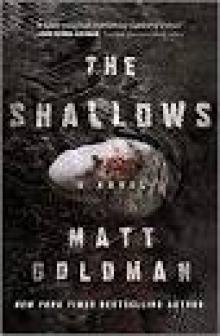 The Shallows--A Nils Shapiro Novel
The Shallows--A Nils Shapiro Novel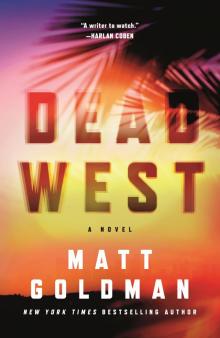 Dead West
Dead West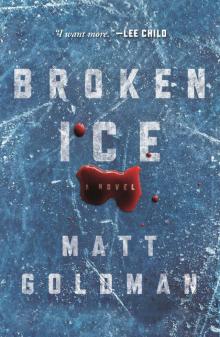 Broken Ice
Broken Ice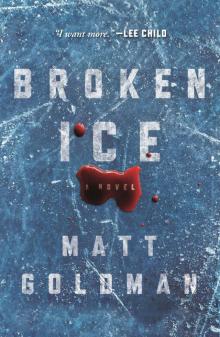 Broken Ice--A Novel
Broken Ice--A Novel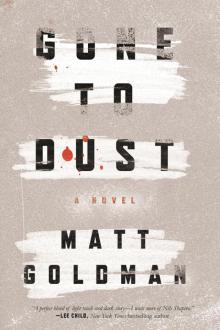 Gone to Dust
Gone to Dust